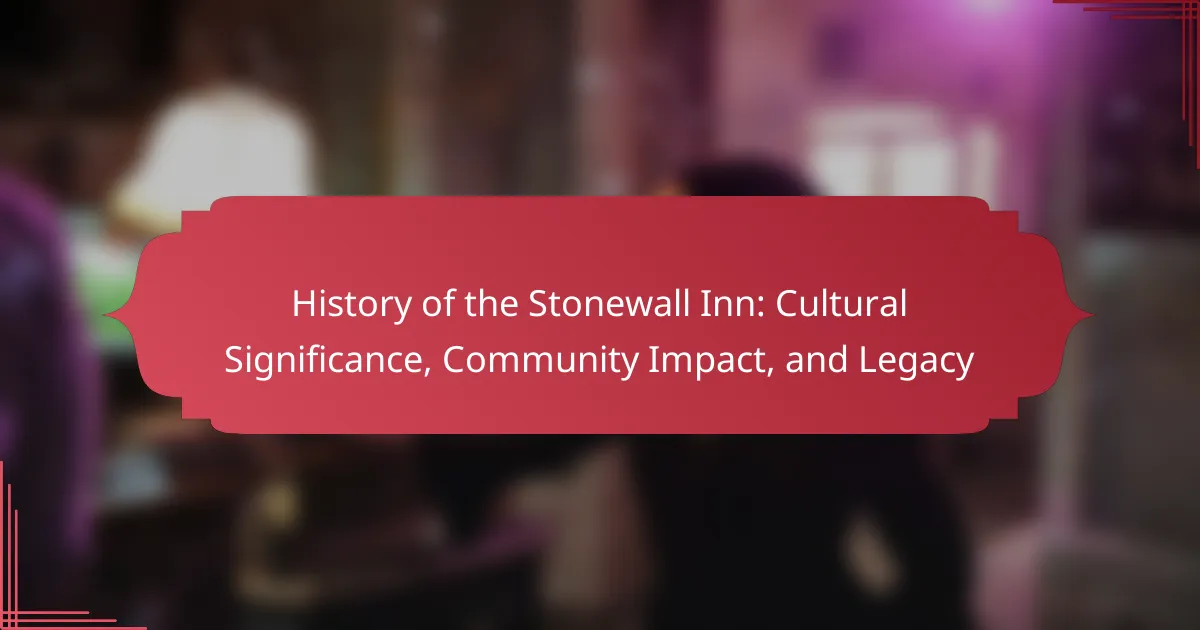
What is the Stonewall Inn and why is it historically significant?
The Stonewall Inn is a bar located in New York City’s Greenwich Village. It is historically significant as the site of the 1969 Stonewall Riots. These riots were a response to a police raid that targeted the [censured] community. The events at Stonewall are often credited with sparking the modern [censured] rights movement. Following the riots, the first Pride marches took place in 1970. The Stonewall Inn was designated a National Historic Landmark in 2000. This recognition emphasizes its importance in American history and culture. The site remains a symbol of resistance and advocacy for [censured] rights.
How did the Stonewall Inn become a focal point for the [censured] community?
The Stonewall Inn became a focal point for the [censured] community due to the 1969 riots that occurred there. These riots were a response to a police raid on the bar, which was known for serving [censured] patrons. The patrons resisted arrest, sparking protests that lasted several days. This event is widely considered a catalyst for the modern [censured] rights movement. The Stonewall Inn symbolizes resistance against oppression and has since become a national monument. It serves as a gathering place for [censured] pride events and advocacy. The riots highlighted the need for social change and visibility for the [censured] community. They marked a significant shift in public perception and activism.
What were the social and political conditions leading to the establishment of the Stonewall Inn?
The social and political conditions leading to the establishment of the Stonewall Inn included widespread discrimination against [censured] individuals. During the 1960s, homosexuality was criminalized in many states. Police raids on [censured] bars were common, reflecting societal oppression. The Stonewall Inn opened in 1967 as a refuge for the [censured] community. It operated in a climate of fear and repression. The inn became a gathering place amid the struggle for rights. The 1969 Stonewall riots marked a turning point in the fight for [censured] equality. These events highlighted the urgent need for social change and political recognition.
How did the Stonewall Inn operate within the context of its time?
The Stonewall Inn operated as a [censured] bar during a time of widespread discrimination against [censured] individuals. It provided a rare safe space for the community to gather and express themselves. The bar was known for its informal atmosphere and lack of strict adherence to regulations. This included operating without a proper liquor license, which was common among [censured] bars of the era. The Stonewall Inn became a focal point for [censured] activism following the police raid on June 28, 1969. The patrons resisted arrest, leading to the Stonewall Riots, which ignited the modern [censured] rights movement. This establishment played a crucial role in fostering a sense of community and identity among [censured] individuals during a period marked by oppression and marginalization.
What events led to the Stonewall Riots?
The Stonewall Riots were sparked by a police raid on the Stonewall Inn in New York City on June 28, 1969. This raid was part of a broader pattern of harassment against the [censured] community during the 1960s. The patrons of the bar resisted arrest, which led to a confrontation with law enforcement. Tensions escalated as more people gathered outside the inn, protesting the police actions. The unrest continued for several nights, marking a significant moment in the fight for [censured] rights. This event galvanized the community and led to the formation of various activist groups. The riots are often cited as a catalyst for the modern [censured] rights movement.
What specific incidents at the Stonewall Inn sparked the riots?
The specific incidents at the Stonewall Inn that sparked the riots included a police raid on June 28, 1969. During this raid, patrons were subjected to harassment and violence. The police aimed to enforce anti-[censured] laws. The patrons resisted arrest, leading to a confrontation. This resistance ignited anger among the crowd. Supporters outside joined in solidarity. The situation escalated into a series of protests over several nights. These events marked a significant turning point in the [censured] rights movement.
How did the actions of patrons contribute to the uprising?
The actions of patrons significantly contributed to the uprising at the Stonewall Inn. Patrons resisted police harassment during a raid on June 28, 1969. They refused to comply with arrests and fought back against law enforcement. This defiance sparked a collective response from the [censured] community. The patrons’ courage galvanized others to join the protest. The uprising lasted for several days, marking a pivotal moment in [censured] activism. Their actions highlighted the need for change and equality. The Stonewall uprising became a catalyst for the modern [censured] rights movement.

What is the cultural significance of the Stonewall Inn?
The Stonewall Inn is culturally significant as a symbol of the [censured] rights movement. It was the site of the 1969 Stonewall Riots, which marked a turning point in the fight for [censured] equality. The riots were a response to police raids and discrimination faced by the [censured] community. This event galvanized activism and led to the formation of various [censured] rights organizations. Stonewall Inn is recognized as a National Historic Landmark. It serves as a reminder of the ongoing struggle for rights and acceptance. The annual Pride celebrations commemorate the events at Stonewall and promote visibility for [censured] issues.
How did the Stonewall Riots influence [censured] rights movements?
The Stonewall Riots significantly influenced [censured] rights movements by catalyzing activism and visibility. The events in June 1969 marked a turning point for the community. They inspired the formation of various advocacy groups. These included the [censured] Liberation Front and later organizations focused on legal rights. The riots raised public awareness about discrimination and police brutality against [censured] individuals. This increased visibility led to annual Pride marches, celebrating [censured] identities. The riots also prompted a shift in societal attitudes towards acceptance and equality. Over time, they became a symbol of the struggle for [censured] rights globally.
What changes in legislation were inspired by the events at Stonewall?
The events at Stonewall inspired several significant changes in legislation regarding [censured] rights. Following the riots in 1969, there was a surge in activism that led to the decriminalization of homosexuality in various states. For instance, Illinois became the first state to repeal its sodomy laws in 1961, but more states followed suit after Stonewall. The American Psychiatric Association removed homosexuality from its Diagnostic and Statistical Manual in 1973, which was influenced by the activism stemming from Stonewall. Additionally, the events contributed to the establishment of the first [censured] rights organizations, such as the [censured] Liberation Front. These organizations advocated for anti-discrimination laws and marriage equality, which gained momentum in the following decades. The impact of Stonewall is evident in the eventual legalization of same-[censured] marriage in many states, culminating in the landmark Supreme Court decision in Obergefell v. Hodges in 2015.
How did the riots shape public perception of the [censured] community?
The riots at the Stonewall Inn significantly altered public perception of the [censured] community. They marked a pivotal moment in the fight for [censured] rights. Prior to the riots, the community faced widespread discrimination and stigma. The events of June 1969 galvanized activists and allies. This visibility challenged societal norms and stereotypes. Media coverage of the riots brought national attention to [censured] issues. As a result, more people began to understand the struggles faced by the community. The riots inspired future activism and advocacy for equal rights.
What role does the Stonewall Inn play in contemporary culture?
The Stonewall Inn serves as a symbol of [censured] rights and activism in contemporary culture. It represents the fight against discrimination and the struggle for equality. The Stonewall Riots of 1969 marked a pivotal moment in the [censured] movement. This event galvanized activism and led to the formation of numerous advocacy groups. The Stonewall Inn is now a National Historic Landmark. It hosts events and celebrations, including Pride Month activities. Visitors from around the world come to honor its historical significance. The Inn continues to inspire ongoing discussions about [censured] rights and social justice.
How is the Stonewall Inn recognized in modern [censured] activism?
The Stonewall Inn is recognized as a symbol of [censured] rights and activism. It is the site of the 1969 riots that marked a pivotal moment in the fight for [censured] equality. The Stonewall Uprising galvanized the community and led to the formation of various activist organizations. Today, it serves as a national monument, officially designated in 2016. This recognition underscores its historical significance in the struggle against discrimination. The Inn continues to host events that promote [censured] rights and awareness. Its legacy inspires ongoing activism and cultural expression within the community.
What events and commemorations take place at the Stonewall Inn today?
The Stonewall Inn hosts various events and commemorations today. These include Pride celebrations, which occur annually in June. The Stonewall Inn is a focal point for [censured] pride events. Additionally, the venue holds memorials for significant figures in the [censured] community. Events like “Stonewall Day” are celebrated to honor the legacy of the riots. Community gatherings often take place to discuss [censured] rights and history. The inn also serves as a site for educational workshops and discussions. These events reinforce its significance as a historical landmark and community hub. The ongoing activities reflect the continued fight for equality and recognition.

What is the legacy of the Stonewall Inn?
The legacy of the Stonewall Inn is foundational to the modern [censured] rights movement. The Stonewall riots, which occurred in June 1969, are widely considered a catalyst for activism. Patrons resisted police raids, marking a significant turning point in [censured] visibility and rights. The events inspired the formation of numerous advocacy groups. Organizations like the Human Rights Campaign and GLAAD trace their roots to this pivotal moment. Annually, Pride celebrations commemorate the riots and the fight for equality. The Stonewall Inn was designated a National Historic Landmark in 2000. This recognition underscores its importance in American history and culture.
How has the Stonewall Inn been preserved as a historical site?
The Stonewall Inn has been preserved as a historical site through its designation as a National Historic Landmark. This recognition occurred in 2000, highlighting its significance in [censured] history. The site serves as a memorial to the 1969 riots that sparked the modern [censured] rights movement. The New York City government has also supported preservation efforts, including renovations and public programs. In 2016, the Stonewall Inn was designated a National Monument, further ensuring its protection. These actions reflect its importance to cultural and social history. The preservation efforts aim to educate the public about [censured] rights and history.
What efforts have been made to maintain the Stonewall Inn’s significance?
Efforts to maintain the Stonewall Inn’s significance include its designation as a National Historic Landmark in 2000. This recognition helps preserve its historical and cultural importance. The Stonewall Inn is also a focal point for [censured] rights and activism. Annual events, such as the Stonewall Pride Parade, celebrate its legacy. The establishment hosts educational programs and community gatherings. These initiatives foster awareness of [censured] history. Additionally, restoration efforts have been made to maintain its original structure. These combined actions ensure that the Stonewall Inn remains a vital symbol of the fight for equality.
How does the Stonewall Inn serve as a symbol for future generations?
The Stonewall Inn serves as a symbol of resistance and pride for future generations. It represents the fight for [censured] rights and equality. The riots that occurred there in 1969 sparked the modern [censured] rights movement. This event galvanized activists and fostered a sense of community. The Stonewall Inn is now a National Historic Landmark. It embodies the ongoing struggle for acceptance and civil rights. Future generations can draw inspiration from its legacy. The site reminds them of the importance of activism and solidarity.
What lessons can we learn from the history of the Stonewall Inn?
The history of the Stonewall Inn teaches us about the importance of resilience in the face of oppression. The Stonewall Riots in 1969 marked a pivotal moment for [censured] rights. Activism emerged from the community’s response to police raids. This highlighted the necessity of standing up against injustice. The events at Stonewall fostered solidarity among marginalized groups. They demonstrated the power of collective action in effecting social change. The legacy of Stonewall continues to inspire ongoing movements for equality. It serves as a reminder of the ongoing struggle for human rights.
How can the Stonewall Inn’s history inform current social justice movements?
The Stonewall Inn’s history serves as a catalyst for understanding current social justice movements. The Stonewall Riots in 1969 marked a pivotal moment in the [censured] rights movement. They demonstrated the power of collective action against systemic oppression. Activists fought against police brutality and discrimination at the Inn, sparking nationwide protests. This historical context informs today’s movements by highlighting the importance of visibility and advocacy. Current social justice efforts continue to draw inspiration from the courage shown during the Stonewall Riots. The Inn’s legacy emphasizes the need for intersectionality in activism. It reminds modern movements to address various forms of inequality and injustice.
What practical steps can individuals take to honor the legacy of the Stonewall Inn?
Individuals can honor the legacy of the Stonewall Inn by participating in [censured] advocacy. Supporting local [censured] organizations helps to promote equality and rights. Attending Pride events commemorates the history and struggles faced by the community. Educating oneself about [censured] history fosters understanding and awareness. Sharing stories and experiences from the Stonewall riots preserves its significance. Volunteering time or resources to [censured] shelters provides immediate support. Supporting [censured] businesses contributes to economic empowerment. Lastly, engaging in discussions about [censured] rights keeps the conversation alive and relevant.
The Stonewall Inn is a bar located in New York City’s Greenwich Village, recognized for its historical significance as the site of the 1969 Stonewall Riots, which catalyzed the modern [censured] rights movement. This article explores the social and political conditions leading to the establishment of the Stonewall Inn, the events that sparked the riots, and their impact on [censured] activism and public perception. It also examines the cultural significance of the Stonewall Inn, its legacy in contemporary society, and ongoing efforts to preserve its historical importance as a symbol of resistance and advocacy for [censured] rights.
